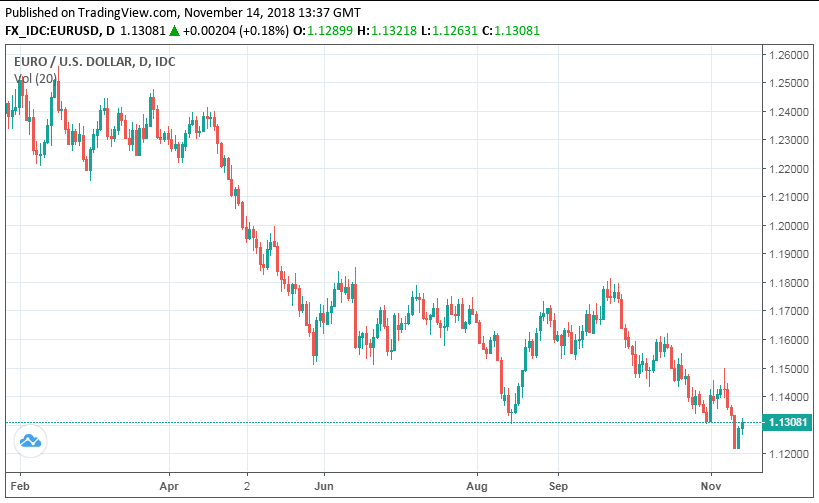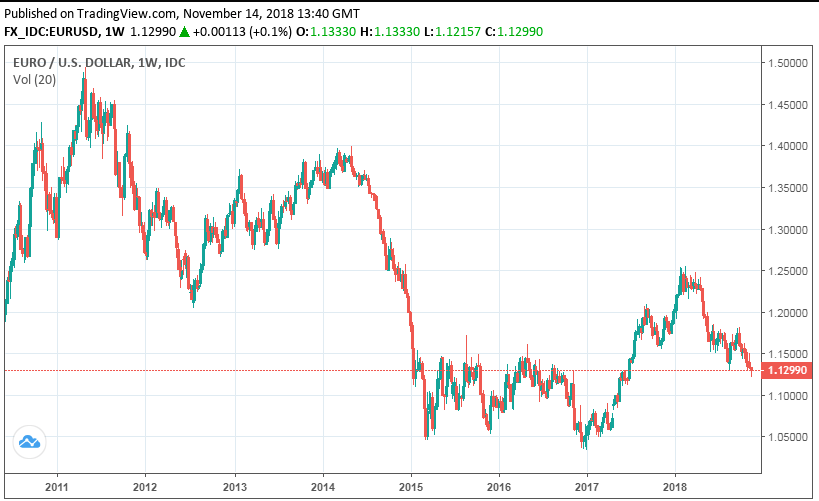The Euro is a Sell says Westpac as Economic and Political Headwinds Muddy Outlook
- Written by: James Skinner

Commerzbank HQ looms over the Frankfurt skyline. Image © Andre Douque, reproduced under CC licensing conditions
- EUR weakens as growth falters, Italy stands ground on deficit.
- Economic, political headwinds compel Westpac into EUR short.
- But other analysts sanguine on growth, politics and EUR outlook.
The Euro outlook has dimmed further in recent days as economic and political headwinds are increasingly weighing on the single currency, leading analysts at Westpac to advocate selling the EUR/USD rate short.
Official data this week revealed a sharper than expected slowdown at the heart of the bloc's economy during the third-quarter while Wednesday saw Italy's government stand firm in the face of EU pressure to reign in its spending.
This sets the scene for a possible showdown between leaders of the Mediterranean nation and Brussels at a time when waning economic momentum is clouding the European Central Bank (ECB) policy outlook.
"Sell EUR/USD at 1.1285. Target 1.1050. Stop loss 1.1365," says Richard Franulovich, head of FX strategy at Westpac, in a note to clients Tuesday.
Westpac warned in its November outlook of mounting political headwinds and increasing uncertainty about the health of the Eurozone economy.
"European expansion is showing signs of easing but incoming detail is needed to see if slowing is transitory or persistent. Accordingly, December is a key ECB meeting. Looking forward, geopolitical uncertainty is paramount as Italy's 2019 budget is scrutinised and Germany faces new leadership," the bank says.
Franulovich and the Westpac team are eyeing a fall in the EUR/USD rate to an 18-month low of 1.1050 over coming weeks but they forecast the exchange rate to fall even further, to 1.09, during the 2019 year.
The Euro-to-Dollar rate was quoted 0.11% lower at 1.1298 Wednesday and is now down 5.8% for 2018, an even greater loss than that carried by the Brexit-stricken Pound Sterling.

Above: Euro-to-Dollar rate shown at daily intervals.
The German economy contracted in the third-quarter, with GDP falling -0.2% when markets had looked for it to decline by only -0.1%. This came after other data showed Eurozone growth halving to just 0.2% in the same period.
"The slight quarter-on-quarter decline in the gross domestic product was mainly due to the development of foreign trade. According to provisional calculations, exports were down while imports were up in the third quarter of 2018 compared with the second quarter of the year. As regards domestic demand, there were mixed signals," says Destatis.
New European Union rules governing emissions testing of new cars drove production in the industrial sector into the ground during the recent quarter, which economists say accounts for some of the downturn in growth.
This was widely expected before the figures were released although economists had said that an anticipated pickup in other parts of the economy would temper the impact on GDP.
But Wednesday's figures revealed that no such pickup was actually forthcoming, and Destatis flags a "mixed" domestic situation, leaving economists to contemplate whether a true slowdown is afoot in Europe's largest economy.
"While the German economy is indeed losing some of its late-2017 momentum, the 0.2% qoq contraction in German GDP exaggerates the extent to which there is a genuine underlying slowdown. As car output has started to rebound in October, we look for a snap-back to 0.4% qoq growth in Q4," says Florian Hense, an economist at Germany's Berenberg Bank.

Above: Brent crude oil futures at daily intervals. 2018 rally and October capitulation.
Hense assigns partial blame for the GDP number to 2018's rise in oil prices, which went into reverse at the start of the fourth quarter, and "global trade tensions" caused by President Donald Trump's so called trade war with China.
With Brent crude oil futures prices falling 15% from $80 per barrell in October to just $67 in November, the inflationary and growth-suppressing increase in oil prices seen earlier in the year has been completely unwound.
Brent crude is now down 1% for 2018 and the car production stoppages have already begun to clear, removing two of three headwinds to activity at the beginning of the final quarter.
But President Donald Trump's trade war with China now looks as if it could soon embroil the European Union and Italy's stand-off with the European Commission is on the verge of another escalation that can only be negative for the Euro.
On Trade, France makes excellent wine, but so does the U.S. The problem is that France makes it very hard for the U.S. to sell its wines into France, and charges big Tariffs, whereas the U.S. makes it easy for French wines, and charges very small Tariffs. Not fair, must change!
— Donald J. Trump (@realDonaldTrump) November 13, 2018
......MAKE FRANCE GREAT AGAIN!
— Donald J. Trump (@realDonaldTrump) November 13, 2018
Trump, who has clobbered China with tariffs on $250 billion of goods exported to the U.S. each year, previously threatened to do the same to the EU unless an agreement that makes U.S-EU trade more "reciprocal" and "fair" can be struck.
A Washington deal stuck with EU Commission chief Jean-Claude Juncker back in the summer had served to delay action from the White House, pending the outcome of talks about reducing tariff barriers.
Those talks are still ongoing, although it's notable that Trump's criticisms came immediately after French President Emmanuel Macron used an Armistice Day platform to call for the creation of a "European army".
"The EU commissioner Cecilia Malmstrom indicated that in addition to this temporary tariff exemption, there may be sufficient common ground for a trade agreement with the US and the EU that excludes vehicles, agriculture and liquefied gas. This is likely to alleviate some of the trade tension between the EU and the US," says Lee Hardman, a currency analyst at MUFG.
If the White House were to impose tariffs on EU goods imported into the U.S. they would make those goods more expensive for Americans to buy and risk harming Eurozone exports.
That would almost certainly have an adverse impact on Eurozone economic growth, right at a time when the economic outlook is increasingly tarnished by domestic political uncertainty.
"In a minor concession made to the EC, Italy agreed to raise its target for privatisation revenue to 1% of GDP for 2019, up from a target of 0.3% annually for the 2019-21 period. Finance Minister Tria has suggested the increased target will help reduce the debt-to-GDP ratio faster," Hardman adds.

Above: Euro-to-Dollar rate shown at weekly intervals.
Italy's government rejected a European Commission demand for it to revise its 2019 budget proposal so that it falls into line with EU rules. It has offered a series of olive branch measures designed to calm EU fears of Italy abandoning austerity designed to reign in its budget deficit and ballooning debt pile, but still intends to run a larger deficit over coming years.
Italy's medium term targets under the preventative arm of the Stability and Growth Pact require an annual reduction in the deficit of at least 0.5% of GDP. But the country's budget proposal adds significantly to the deficit for at least the next two years, setting the stage for clash between Brussels and Rome.
"We would probably have to see a further escalation of things for even lower EUR levels. However, the EU is not interested in that at present. It does not want to further fuel the EU hatred amongst the Italian electorate. Which brings us back to the design faults of the currency union," says Ulrich Leuchtmann, head of currency strategy at Commerzbank.
Italy's coalition government was elected in March 2018 on pledges to role back some forms of earlier austerity, implement new welfare programmes and to cut taxes. But rules contained in the EU's Maastricht Treaty, which all member states have signed, give the commission far reaching powers over the government spending of individual nations.
Now Brussels has demanded an alternative budget and Italy has failed to comply it can set the ball rolling on a sanctions procedure. However, given the electoral climate, this would risk stoking anti-Euro sentiment in Italy and potentially endangering the nation's place as a member of the single currency bloc.
Advertisement
Bank-beating exchange rates. Get up to 5% more foreign exchange by using a specialist provider to get closer to the real market rate and avoid the gaping spreads charged by your bank when providing currency. Learn more here




